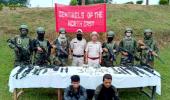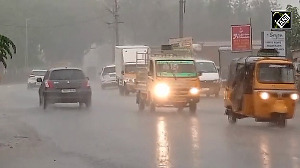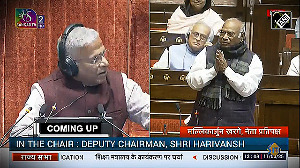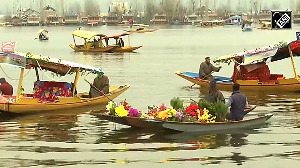Amidst the lingering aftermath of ethnic conflicts, the women traders at Manipur's iconic 'Ima market' -- the only market in the world run entirely by women -- have expressed a deafening lack of enthusiasm towards the upcoming Lok Sabha elections.

Questioning the relevance of the electoral process amidst the ongoing turmoil, the women traders from various market associations, are contemplating a boycott of the polls with their major grievance being -- 'the nation forgot Manipur'.
Nema Devi, a seasoned fish vendor at the market, reflects the sentiment shared by many, emphasising the absence of tangible change despite months of unrest.
"Even 11 months after the violence, there has not been a resolution and no restoration of peace. We continue to live by the rule of taking one day at a time. Living in continuous fear and going ahead with our usual lives.
"What will change with the elections? The nation, the government, everybody forgot Manipur," 52-year-old Devi, who has been running the shop in the market for over a decade, told PTI.
Debjani, a fruits and vegetables vendor, succinctly said, 'Elections nai chahiye' (elections not needed), echoing the prevailing scepticism.
At first glance, the 500-year-old 'Ima Keithel' is much like any other popular market.
Lines of vendors selling everything from fresh fruit to fish and fabrics from dusk until dawn.
But after walking through its long lanes with more than 4,500 stalls spread across three multi-story buildings and a sea of surrounding tin shacks, one unique aspect becomes hard to ignore: every single trader, without exception, is a woman, a fact they take pride in.
The famous market was also the theme of the state's Republic Day tableau this year.
Priya Kharaibam, a third-generation pottery trader, questioned the purpose of elections if the status quo remains unchanged.
"If everything has to go on the way it is going on, why do we need elections? What will change?" she asked.
Against this backdrop, a traders' group in the market called Manipur Keithel Phambi Apunba Lup, has opted to abstain from engaging in election-related activities, citing governmental disregard for the populace's well-being.
"The decision to hold the elections shows that the government has no concern for the life and property of the common people. The people of the state have been witnessing a cycle of violence arising out of conflict between two communities for the last 11 months.
"We have been facing immense hardship due to the protracted violence," said Yumnam Ibeyaima, General Secretary of the traders' body.
The unfolding crisis stemming from clashes between the Meitei and tribal Kuki communities has claimed over 200 lives, with thousands displaced and living in camps.
Asem Nirmala, General Secretary of another traders' body in the market called Lukmaisellup, lamented the lack of governmental responsiveness to the prolonged crisis, emphasising the urgent need for solutions over elections.
"This is the time for solutions. This is not the time for elections. These polls are being enforced at the very wrong time.
"We are contemplating whether we should either not vote or vote in unison against the government in power and give other parties a chance and see if there is restoration of peace. I am trying to counsel the women in the market but they are not keen on voting," she told PTI.
Some traders find themselves at a crossroads, contemplating whether to vote collectively against the incumbent government in pursuit of peace restoration.
As many as 75 'Imas' or 'mothers' (elderly women traders) from the famed market had visited Delhi in June last year and staged a sit-in protest at Jantar Mantar, demanding a solution and opposing any territorial division of the state on ethnic lines.
Expressing disillusionment with the electoral process, Kunjang Phema, a fabric vendor, highlights the failure of elected representatives to address their grievances effectively.
"Why do we choose a representative? So our voices are heard and acted upon. If that has not happened in such a critical situation when will it happen? Why should we vote? We are still contemplating whether to vote or not but if you ask us if we have faith in elections? No," says Phema, who was part of the group.
The elections for two Lok Sabha seats in Manipur will be held in two phases on April 19 and 26.
While Inner Manipur and some segments of Outer Manipur will vote in the first phase on April 19, the remaining segments of Outer Manipur will vote in Phase 2 on April 26.
The Election Commission has announced that the displaced population will have the opportunity to cast their votes from relief camps.
The effort to facilitate voting for the displaced offers a glimmer of hope amidst the prevailing despair, as the state grapples with deep-seated unrest and a yearning for lasting peace.
Amidst the prevailing unrest and feelings of abandonment, the traders' voices echo a profound sense of disillusionment with the government's response to Manipur's plight.
"The government cannot see that Manipur is burning, it feels like it is some state outside India and hence peace here is not on their agenda. Why should we impose our faith in such a system which has abandoned us at this crucial time? Despite the huge deployment of forces, we do not feel safe in our own homeland," said K Dhaneshori.











 © 2025
© 2025